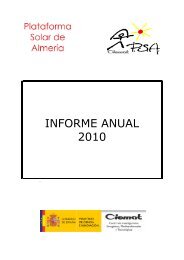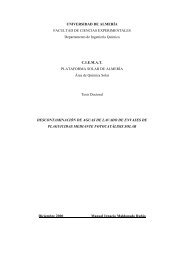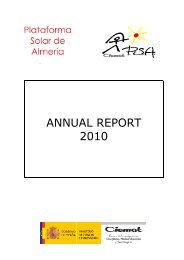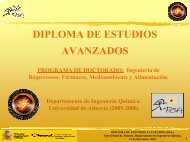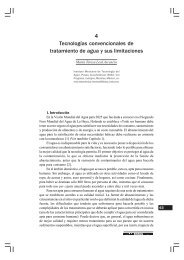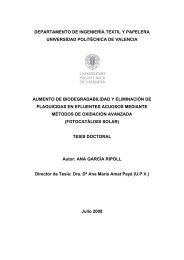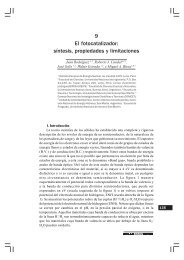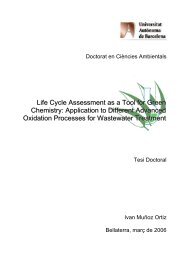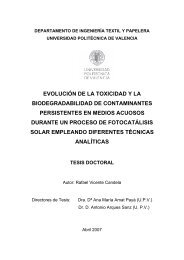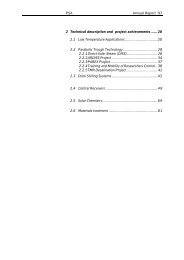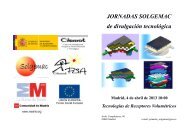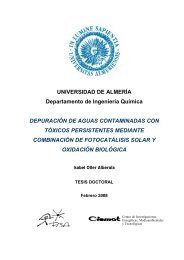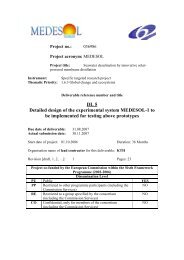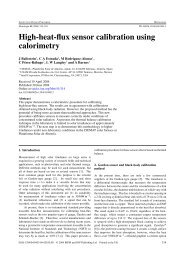Annual Report 2006 - Plataforma Solar de AlmerÃa
Annual Report 2006 - Plataforma Solar de AlmerÃa
Annual Report 2006 - Plataforma Solar de AlmerÃa
You also want an ePaper? Increase the reach of your titles
YUMPU automatically turns print PDFs into web optimized ePapers that Google loves.
ENVIRONMENTAL APPLICATIONS OF SOLAR ENERGY<br />
and bio<strong>de</strong>gradability of the effluent, new automation methods and process<br />
control, and evaluating the influence of effluent salinity.<br />
Objectives achieved in <strong>2006</strong>: The project began in November <strong>2006</strong>, and has<br />
not yet generated relevant results.<br />
4.2.5 SODISWATER<br />
<strong>Solar</strong> disinfection of drinking water for <strong>de</strong>veloping countries<br />
or emergency situations. http://www.rcsi.ie/sodis/<br />
Participants: RCSI (Coord., IR), UU (UK), CSIR (S. Africa), EAWAG (CH),<br />
IWSD (Zimb.), CIEMAT-PSA (ES), Ul (UK), ICROSS (Kenya), USC (E).<br />
Contact:<br />
Dr. Kevin McGuigan, kmcguigan@rcsi.ie<br />
Dr. Pilar Fernán<strong>de</strong>z-Ibáñez, pilar.fernan<strong>de</strong>z@psa.es<br />
Funding: EC, 6 th FP. Specific measures in support of international co-operation<br />
“INCO”. 1,900 k€. CIEMAT Budget: 350 K€.<br />
Duration: September <strong>2006</strong> – August 2009<br />
Motivation: The main purpose of this Project is to <strong>de</strong>monstrate that the SO-<br />
DIS technology (“<strong>Solar</strong> Disinfection) for solar-only disinfection of drinking water<br />
is an effective tool against diseases communicated by domestic water (in<br />
<strong>de</strong>veloping countries) and as an aid in natural disasters. <strong>Solar</strong> disinfection is a<br />
water <strong>de</strong>pollution technique that commonly uses transparent plastic bottles<br />
full of water exposed to direct solar radiation for 6-8 hours. This process reduces<br />
the levels of fecal contamination of 1 million bacteria per ml to zero in<br />
less than 1.5 hours and is completely effective in treatment of pathogens responsible<br />
for such diseases as cholera, dysentery, typhus, giardiasis, salmonellosis,<br />
gastroenteritis and poliomyelitis. The only clinical test to date for this<br />
technology, carried out in a community in Kenya, has <strong>de</strong>monstrated that children<br />
un<strong>de</strong>r 5 years of age who drank SODIS-treated water were 7 times less<br />
likely to contract cholera than those who did not. There are no limitations to<br />
SODIS applications in high solar radiation areas (e.g. Africa), and its cost is<br />
practically nil as the only material required is transparent plastic bottles.<br />
Purpose: The project is basically focused on Sub-Saharan Africa. Its strategic<br />
objectives are the following:<br />
• Demonstrate SODIS as a suitable and effective technique for making<br />
contaminated water fit for human consumption in small communities in<br />
<strong>de</strong>veloping countries that do not have easy access to “safe water”. Its<br />
application is equally effective in natural catastrophes or acci<strong>de</strong>nts that<br />
place access to drinking water in jeopardy.<br />
• Test and evaluate strategies for changing behavior and spreading information<br />
about SODIS as a drinking water treatment technique in<br />
zones with different sociocultural profiles.<br />
• Communicate the results of project research through international aid<br />
organizations (to <strong>de</strong>veloping countries and victims of catastrophes) so<br />
SODIS is recommen<strong>de</strong>d as a quality measure for intervention meeting<br />
water treatment standards (e.g., filtration, chlorination, <strong>de</strong>salination,<br />
etc.).<br />
• Development of a series of technological improvements in the SODIS<br />
process, based on the use of ultraviolet disinfection dose indicators,<br />
solar-radiation activated photocatalysts and solar collector modules<br />
(CPCs). to be used <strong>de</strong>pending on socio-economic conditions<br />
79



